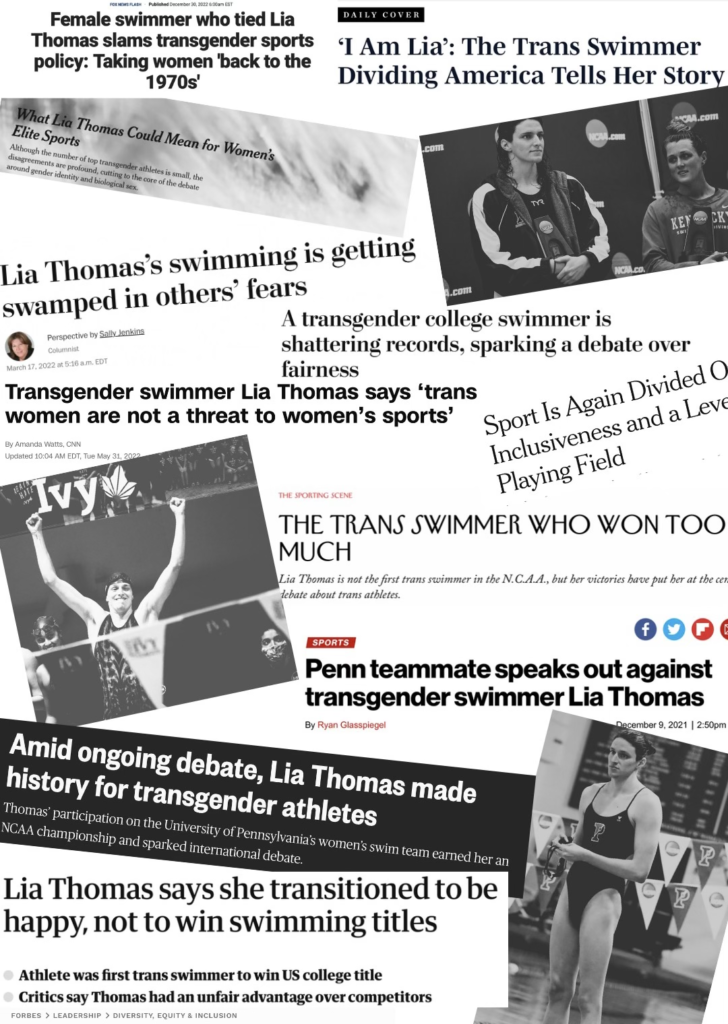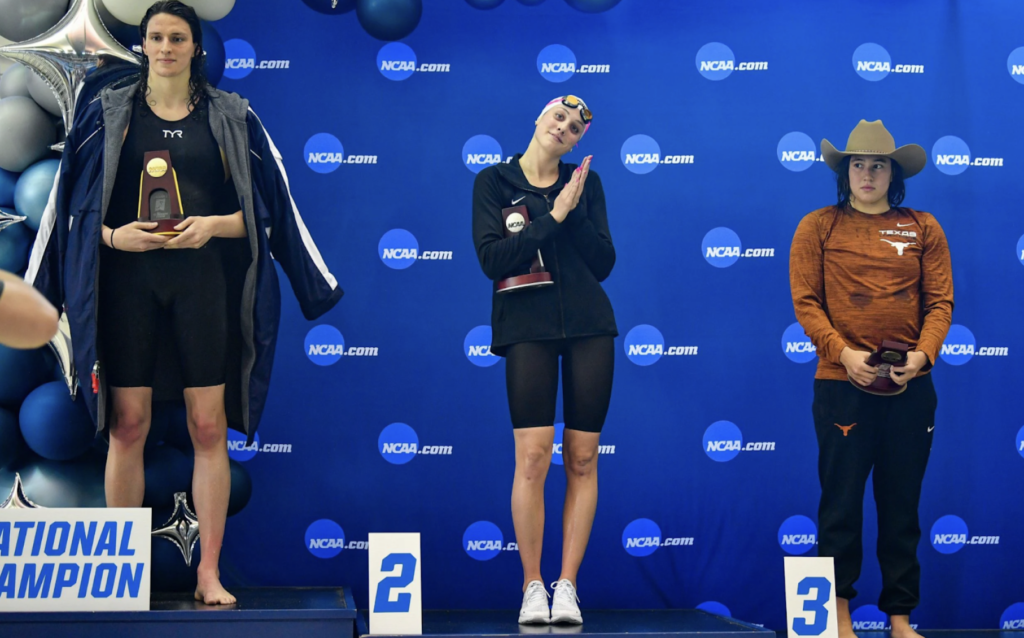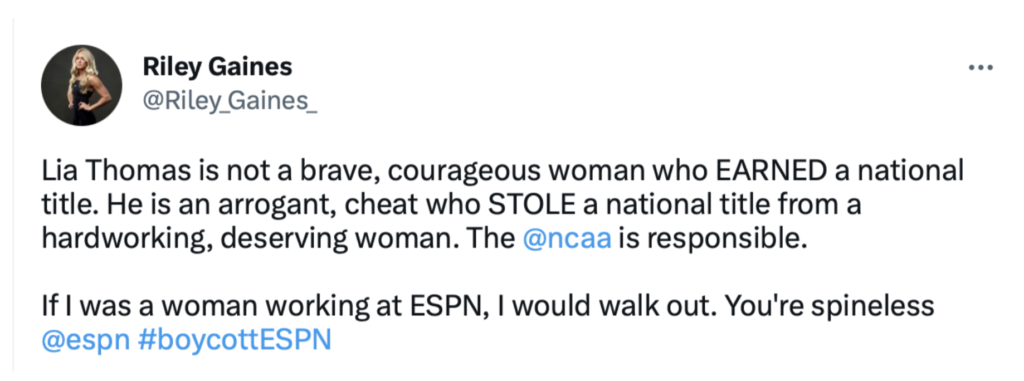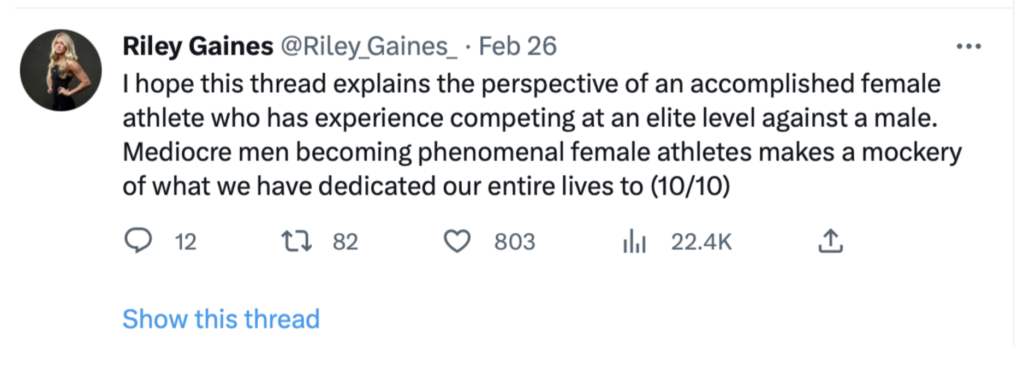
Swimmer Lia Thomas made waves after placing first in the 500-yard freestyle at the NCAA Division I Women’s Swimming Championships, becoming the first transgender woman to win a national championship (Shermer, 2022).
Lia competed on the University of Pennsylvania’s men’s swim team from 2017 to 2020 and its women’s swim team from 2021 to 2022 (Bonesteel, 2022). She set pool, school, and Ivy League records, quickly becoming a powerful, path-breaking, and controversial figure in collegiate sports.
Despite her impressive accomplishments, she has faced public backlash and consistent transphobic rhetoric in the media. In a recent interview with ESPN and ABC News, Lia explained, “People will say, oh, she just transitioned so she would have an advantage, so she could win. I transitioned to be happy, to be true to myself” (Chang, 2022). Lia’s experiences reveal the challenges that collegiate transgender athletes experience at large and the public scrutiny they face.

Penn senior Lia Thomas won 500-yard freestyle races at the NCAA Women’s Swimming and Diving Championships.
Institutional Biological Policy
The experiences and difficulties of transgender athletes remain poorly understood by much of society. The world of sports is rooted in the presumption that individuals easily fit into the categories of female and male (Krane et al, 2012). This may seem manageable for most; however, transgender individuals face unique challenges posed by this binary presumption of gender (Phipps, 2021).
Whereas some praise Lia’s accolades as a milestone for transgender athletes, others discredit her accomplishments, arguing that she has anatomic and physiologic advantages over a biological woman (Safer, 2022). The foundation of this argument derives from the fact that transgender women have a greater amount of testosterone, a stronger physical stature, and a higher aerobic capacity, on average, which allows them to perform better than cisgender women (Safer, 2022). USA Swimming disclosed that “the top-ranked female in 2021, on average, would be ranked 536th across all short course yards (25 yards) male events in the country” (Bonesteel, 2022).
Due to these physical differences, the National Collegiate Athletic Association (NCAA) mandates that transgender women maintain serum testosterone levels below 5 nanomoles per liter (nmol/L) and be treated with hormone-lowering medical regimens for at least 1 year prior to competition (Transgender Student-Athlete Participation Policy).
The Price of Success
As Lia’s victories accumulate, she continues to face publicized hatred. The criticism and backlash range from genuine concern about competitive fairness to blatant transphobia (Shermer 2022). These transphobic tweets create pressure for transgender athletes to conform to traditional gender norms to avoid harassment and embarrassment (Phipps 2021).
After tying Riley Gaines, a former swimmer for the University of Kentucky, in the 2022 NCAA Championships, Lia began to receive hateful and transphobic backlash on Twitter and other platforms. Tweets like these cause transgender athletes to feel social isolation, marginalization, and a decreased sense of connectedness (Caudwell, 2021). Transphobic critiques in collegiate sports can make it hard for those athletes grappling with their gender identity and potentially deter athletes from expressing who they really are. Failure to recognize Lia for who she is is just the tip of the transphobic iceberg deeply rooted in collegiate sports.

Riley Gaines (Former University of Kentucky Swimmer) Tweet Directed at Lia Thomas, ESPN, and the NCAA

Riley Gaines (Former University of Kentucky Swimmer) Tweet Directed at Transgender Athletes.
Moving Forward…
Despite the polarizing coverage in the media, one positive result of Lia’s experiences is that it has shed light on this social issue and can allow other transgender athletes to recognize that they are not alone. Lia says in an interview with Sports Illustrated: “I just want to show trans kids and younger trans athletes that they’re not alone. They don’t have to choose between who they are and the sport they love” (Cash, 2022).
Collegiate sports offer a co-curricular opportunity that complements academics; the true spirit is about collaboration and enjoyment. Disparaging and belittling transgender athletes can take away the joy and pride that comes with participating in collegiate athletics (Hargie, 2017). Wherever the line is drawn regarding participation, society must end transphobia in sports and change antiquated beliefs about who and what a true athlete should be.
References:
Bianchi A. (2017). Transgender Women in Sport. Journal of the Philosophy of Sport. 2017;44(2):229-242. doi:10.1080/00948705.2017.1317602.
Birle, J. (2023). Riley Gaines says Lia Thomas ‘stole a national title’. Restoring America. Retrieved March 28, 2023, from washingtonexaminer.com/restoring-america/equality-not-elitism/riley-gaines-says-lia-thomas-stole-national-title.
Bonesteel, M. (2022). “USA Swimming issues new policy for transgender athletes in Elite Competition.” The Washington Post. washingtonpost.com/sports/2022/02/01/usa-swimming-transgender-policy/.
Cash, M. (2022). “Penn Swimmer Lia Thomas Wants to Show Trans Kids They ‘Don’t Have to Choose between Who They Are and the Sport They Love’.” Insider, insider.com/penn-swimmer-lia-thomas-inspire-transgender-kids-sports-2022-3.
Caudwell J. (2021). Queering indoor swimming in the UK: Transgender and non-binary wellbeing. Journal of Sport and Social Issues, 46(4), 338–362. doi.org/10.1177/01937235211043648.
Chang, Juju (2022). “Lia Thomas; The Interview.”
Hao, Steven (2022). “NCAA Swimming holds fast on transgender student-athlete eligibility, Lia Thomas to swim at ivies, NCAA Swimming Holds Fast on Transgender Student-Athlete Eligibility, Lia Thomas to Swim at Ivies.” The Columbia Journal of Law & the Arts. journals.library.columbia.edu/index.php/lawandarts/announcement/view/504.
Hargie, Owen (2017). “People have a knack of making you feel excluded if they catch on to your difference’: Transgender experiences of exclusion in sport” Journal of the Sociology of Sport, Volume 52, doi.org/10.1177/1012690215583283.
Krane, et al (2012). “Broken Binaries and Transgender Athletes: Challenging Sex and Gender in Sports,” Sexual Orientation and Gender Identity in Sport (pp. 13-23). Center for Sport Management Research and Education.
Phipps, Catherine (2021). “Thinking beyond the binary: Barriers to trans* participation in university sport.” Journal of the Sociology of Sport, Volume 56, doi.org/i1.o0r.g1/107.171/1770/1206129609201291898899621/.
Safer, Joshua (2022). “Fairness for Transgender People in Sport.” Journal of the Endocrine Society, Volume 6, Issue 5. doi.org/10.1210/jendso/bvac035.
Shermer, Michael (2022). “Trans Athletes and Conflicting Rights: Male-to-Female transgender swimmer Lia Thomas from the University of Pennsylvania is crushing the Female competition.” Skeptic [Altadena, CA], vol. 27, no. 1, Wntr 2022, pp. 23+. Gale Academic OneFile, link.gale.com/apps/doc/A698308725/AONE?u=nysl_ce_hamilton&sid=bookmark-AONE&xid=353f1696.
Transgender Student-Athlete Participation Policy. NCAA.org. (n.d.). Retrieved March 5, 2023, from ncaa.org/sports/2022/1/27/transgender-participation-policy.aspx.